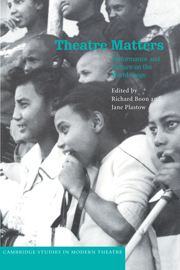Book contents
- Frontmatter
- Contents
- Notes on contributors
- Foreword: A letter from Kingston
- Preface
- Acknowledgements
- 1 Introduction
- 2 ‘The Revolution as Muse’: drama as surreptitious insurrection in a post-colonial, military state
- 3 Making theatre for a change: two plays of the Eritrean liberation struggle
- 4 Race matters in South African theatre
- 5 Dreams of violence: moving beyond colonialism in Canadian and Caribbean drama
- 6 The French-speaking Caribbean: journeying from the native land
- 7 ‘Binglishing’ the stage: a generation of Asian theatre in England
- 8 Popular theatre for the building of social awareness: the Indian experience
- 9 The promise of performance: True Love/Real Love
- 10 Making America or making revolution: the theatre of Ricardo Halac in Argentina
- Index
9 - The promise of performance: True Love/Real Love
Published online by Cambridge University Press: 25 October 2009
- Frontmatter
- Contents
- Notes on contributors
- Foreword: A letter from Kingston
- Preface
- Acknowledgements
- 1 Introduction
- 2 ‘The Revolution as Muse’: drama as surreptitious insurrection in a post-colonial, military state
- 3 Making theatre for a change: two plays of the Eritrean liberation struggle
- 4 Race matters in South African theatre
- 5 Dreams of violence: moving beyond colonialism in Canadian and Caribbean drama
- 6 The French-speaking Caribbean: journeying from the native land
- 7 ‘Binglishing’ the stage: a generation of Asian theatre in England
- 8 Popular theatre for the building of social awareness: the Indian experience
- 9 The promise of performance: True Love/Real Love
- 10 Making America or making revolution: the theatre of Ricardo Halac in Argentina
- Index
Summary
O gringo vem aqui e não conhece a realidade
Vai para Zona Sul para conhecer agua de coco
(The gringo comes here and doesn't know the reality
Goes to Zona Sul to know coconut water)
In her introduction to Acting Out: Feminist Performances, Peggy Phelan marks the difference between True Love and Real Love in the persistently disruptive promises of feminist performance:
Like all promises they won't be kept. And that's the point. For by not keeping them these artists allow us to be loosened from our enthralment with the future they promise (a future itself enfolded and articulated within a narrow narrative model) and, more important, the failure of these promises allows us to disengage from a particular romance with our future selves … True Love becomes less heroic and Real Love more palpable. Performance can't rely on the future: it lives and loves and fails and wins and whines in the pressing present.
My own relationship with theatre in Brazil has had to negotiate similar bonds and boundaries between True Love and Real Love, which began but has not ended with the work of Augusto Boal. In the bleakness of Britain in the late 1980s, Boal offered a romance with theatre and its infinite possibilities that seemed to be disappearing in a culture of despair and disengagement. His brief appearances to give workshops, and the eventual publication of Games for Actors and Non-Actors to supplement our tattered copies of Theatre of the Oppressed, began to stimulate interest in a theatre praxis that was ludic, functional and confident in its social role. But as in all long-distance relationships there was always something missing. Hence my arrival in Brazil.
- Type
- Chapter
- Information
- Theatre MattersPerformance and Culture on the World Stage, pp. 154 - 176Publisher: Cambridge University PressPrint publication year: 1998
- 2
- Cited by

